Unit 8 Lesson 45 Different Manners 课件+音频(共24张PPT) 冀教版英语九年级全一册
文档属性
| 名称 | Unit 8 Lesson 45 Different Manners 课件+音频(共24张PPT) 冀教版英语九年级全一册 | 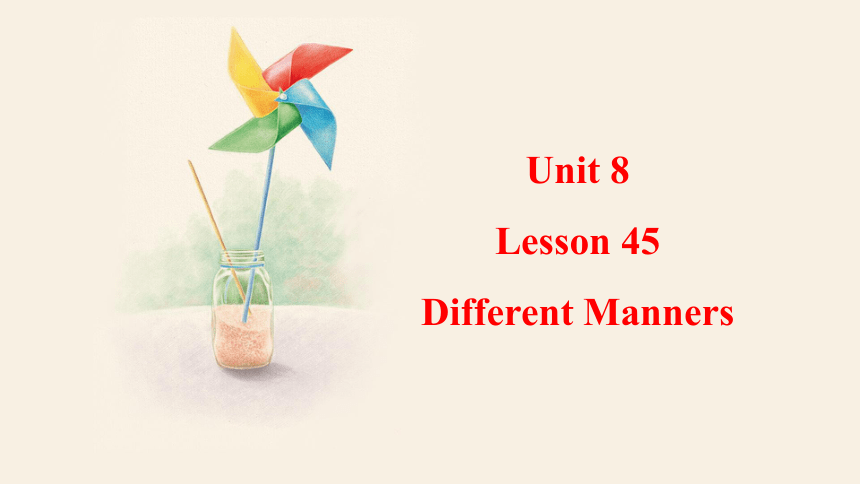 | |
| 格式 | pptx | ||
| 文件大小 | 5.3MB | ||
| 资源类型 | 教案 | ||
| 版本资源 | 冀教版 | ||
| 科目 | 英语 | ||
| 更新时间 | 2023-12-17 22:09:31 | ||
图片预览


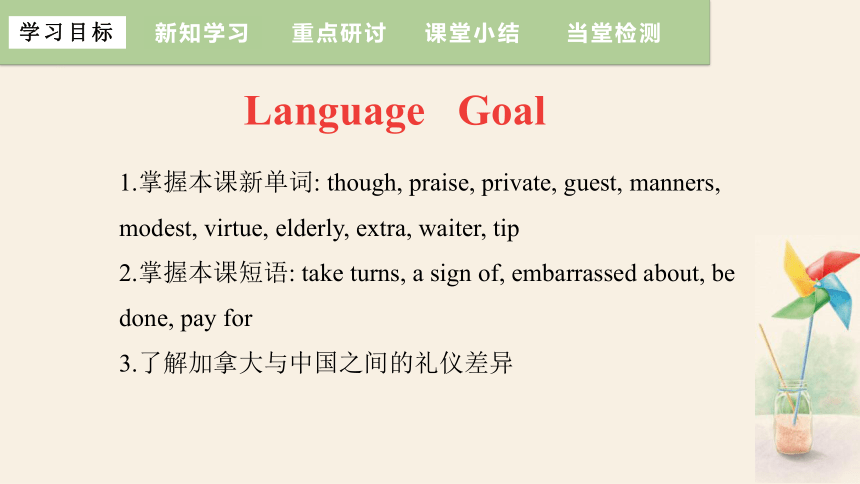
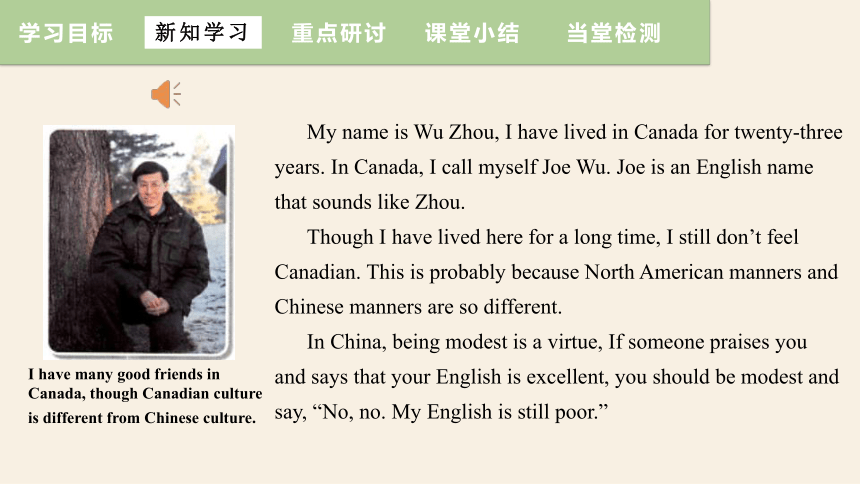
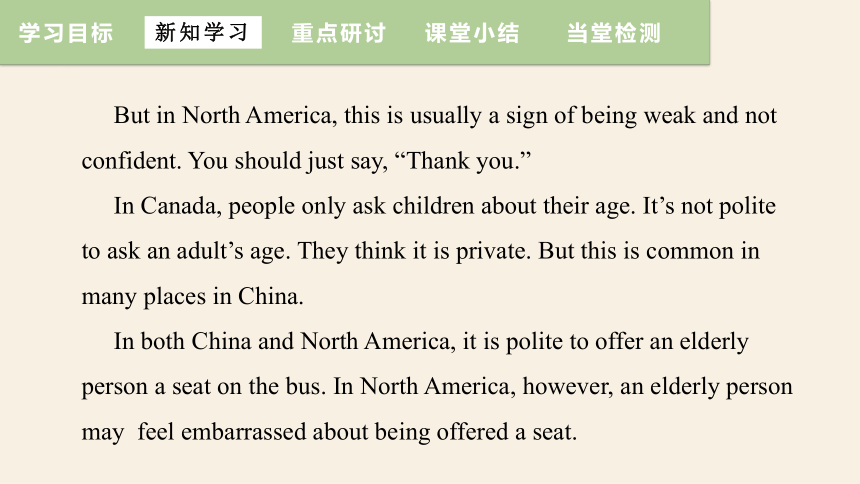

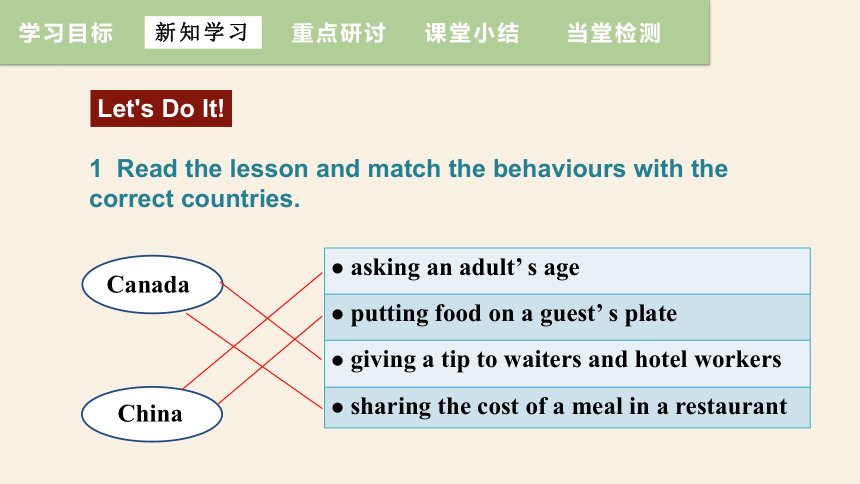

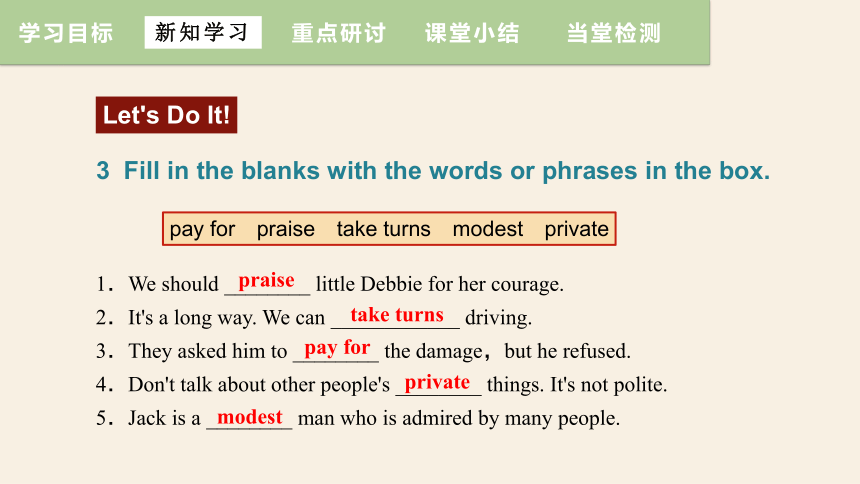
文档简介
(共24张PPT)
Unit 8
Lesson 45
Different Manners
新
课
导
入
Is it a good manner
Why do you think so
In your opinion, what are good manners
Do you think cultures shape manners
Language Goal
新知学习
课堂小结
当堂检测
学习目标
重点研讨
1.掌握本课新单词: though, praise, private, guest, manners, modest, virtue, elderly, extra, waiter, tip
2.掌握本课短语: take turns, a sign of, embarrassed about, be done, pay for
3.了解加拿大与中国之间的礼仪差异
新知学习
课堂小结
当堂检测
学习目标
重点研讨
My name is Wu Zhou, I have lived in Canada for twenty-three years. In Canada, I call myself Joe Wu. Joe is an English name that sounds like Zhou.
Though I have lived here for a long time, I still don’t feel Canadian. This is probably because North American manners and Chinese manners are so different.
In China, being modest is a virtue, If someone praises you and says that your English is excellent, you should be modest and say, “No, no. My English is still poor.”
I have many good friends in Canada, though Canadian culture is different from Chinese culture.
新知学习
课堂小结
当堂检测
学习目标
重点研讨
But in North America, this is usually a sign of being weak and not confident. You should just say, “Thank you.”
In Canada, people only ask children about their age. It’s not polite to ask an adult’s age. They think it is private. But this is common in many places in China.
In both China and North America, it is polite to offer an elderly person a seat on the bus. In North America, however, an elderly person may feel embarrassed about being offered a seat.
新知学习
课堂小结
当堂检测
学习目标
重点研讨
When Chinese people eat out in restaurants they may take turns paying for the meal. In Canada, however, people often share the cost of a meal.
In China, if your guests have no food on their plates, it’s polite to put food on their plates. In Canada, you pass food to guests, but you don’t usually put food on their plates.
In China, people seldom give extra money to waiters, waitresses, taxi drivers or hotel workers. In North America , this is always done. It is called “tipping”.
It’s interesting to experience two different cultures. I think understanding cultural differences really helps us to understand each other,live together and work together.
新知学习
课堂小结
当堂检测
学习目标
重点研讨
1 Read the lesson and match the behaviours with the correct countries.
China
Canada
asking an adult’ s age
putting food on a guest’ s plate
giving a tip to waiters and hotel workers
sharing the cost of a meal in a restaurant
Let's Do It!
新知学习
课堂小结
当堂检测
学习目标
重点研讨
2 Match and complete the sentences.
Although people have different cultures and customs,
Brian hasn’t been to China,
He has been at the new school for only a few days,
Though Liu Feng has many friends in America,
but he has already made many friends there.
they have the same feelings.
he still feels lonely.
but he knows a lot about our country.
Note that we should not use “although/though” and
“but” together in the same sentence.
新知学习
课堂小结
当堂检测
学习目标
重点研讨
3 Fill in the blanks with the words or phrases in the box.
1.We should ________ little Debbie for her courage.
2.It's a long way. We can ____________ driving.
3.They asked him to ________ the damage,but he refused.
4.Don't talk about other people's ________ things. It's not polite.
5.Jack is a ________ man who is admired by many people.
praise
take turns
pay for
private
modest
Let's Do It!
pay for praise take turns modest private
新知学习
课堂小结
当堂检测
学习目标
重点研讨
4 What cultural differences,besides the ones already discussed,have you noticed between China and English speaking countries Share your ideas with your classmates.
Different
manners
greeting,parting
table manners
festivals
receiving
gifts
teaching
system
invitation
重点研讨
课堂小结
当堂检测
学习目标
新知学习
sound/sa nd/ n. 声音 v. 听起来
eg:Your idea sounds very good.
你的主意听起来很好。
知识点
1
考向一
sound 作动词的用法:
(1)sound 可作连系动词,后跟形容词。
eg:Her voice sounds beautiful.
她的声音听起来很美。
重点研讨
课堂小结
当堂检测
学习目标
新知学习
(2)sound like意为“听起来像……”,后跟名词(短语)。
eg:The man doesn't sound like an American.
那个人(讲话的口音)听起来不像一个美国人。
(3)sound 后还可跟as if,后跟句子,意为“听起来像……”。
eg:She sounds as if she were a ten -year- old girl.
她说话的声音听起来像个十岁的女孩。
重点研讨
课堂小结
当堂检测
学习目标
新知学习
praise/pre z/ n.& v.称赞;赞扬
知识点
2
eg:The guests praised the meal.
客人们称赞这顿饭(做得好)。
praise作动词的用法:praise+n./pron.称赞……
eg:They have been praising you all the time.
他们一直在夸奖你。
praise sb.for sth.因某事赞扬某人
eg:He praised her for her courage.
由于她的勇敢,他赞扬了她。
考向一
重点研讨
课堂小结
当堂检测
学习目标
新知学习
praise作名词的用法:
praise表示对人或事物的“称赞;赞扬”时,通常为不可数名词;也可用praises的形式,但较少见。
eg:He won praise for his modesty.
他因自己的谦虚赢得了赞扬。
in praise of 赞扬
eg: The teacher spoke in praise of the child for his honesty.
由于这个孩子的诚实,老师表扬了他。
考向二
重点研讨
课堂小结
当堂检测
学习目标
新知学习
take turns 轮流
知识点
3
考向一
take turns常用于take turns to do sth.或take turns (at) doing sth.结构中,意为“轮流做某事”。
eg:Take turns to ask questions.
轮流提问题。
【重点】
eg:We take turns cooking dinner.
我们轮流做饭。
重点研讨
课堂小结
当堂检测
学习目标
新知学习
“轮流做某事”的其他表达法:
do sth.in turn
do sth.by turns
eg:The nurses attended the patient in turn/by turns.护士们轮流护理那个病人。
考向二
拓展
It's one's turn to do sth.意为“轮到某人做某事了”。
eg:It's your turn to read the text.
轮到你读这篇课文了。
重点研讨
课堂小结
当堂检测
学习目标
新知学习
pay for为……付钱
知识点
4
考向一
pay for sth.付款买某物
eg:He can't pay for the TV set at the moment.
他现在还不能给这台电视机付款。
pay for sb.替某人付款
eg:Shall I pay for you?我替你付款好吗?
eg:I'll pay for the food and you will pay for the
drinks. 我付饭菜钱,你付酒水钱。
重点研讨
课堂小结
当堂检测
学习目标
新知学习
pay的用法:
pay sb.付款给某人
eg:Have you paid the doctor yet
医生的酬金你付了吗?
pay sb.+钱+for sth.给某人钱买某物
eg:I paid the shopkeeper 10 yuan for the book.
我向店主付了十元钱买这本书。
考向二
重点研讨
课堂小结
当堂检测
学习目标
新知学习
拓展
cost,spend,take和pay的辨析
结构 例子
cost sth.+cost的相应形式+人+时间/金钱 The ticket cost me ten dollars.
这张票花了我十美元。
spend 人+spend的相应形式+时间/金钱+doing/on sth. She spent $100 on a new dress.
她花100美元买了一条新连衣裙。
take It+takes/took+人+时间+to do sth. It takes me an hour to walk there.我花了一小时走到那儿。
pay 人+pay的相应形式+金钱+for sth. He paid $5 for that book.
他花了5美元买那本书。
【易错点】
重点研讨
课堂小结
当堂检测
学习目标
新知学习
experience/ k‘sp ri ns/ v. 体验;经历
n. 经验;经历
知识点
5
考向一
experience作动词时,可意为“体验;经历”。
eg:We had never experienced this kind of holiday before and had no idea what to expect.
我们以前从未经历过这种假期,不知道有什么可期待的。
eg:He experienced a lot of difficulties in his life.
在他的生活中,他经历了很多困难。
重点研讨
课堂小结
当堂检测
学习目标
新知学习
experience 作名词,意为“经验”时,是不可数名词。
eg:He has a lot of experience in teaching.
他有丰富的教学经验。
experience作名词,意为“经历”时,是可数名词。
eg:He had a scary experience on the trip to Yunnan.他在去云南旅行的途中,有一段可怕的经历。
考向二
课堂小结
重点研讨
当堂检测
学习目标
新知学习
Unit 8
Lesson 45
1.掌握本课新单词: though, praise, private, guest, manners, modest, virtue, elderly, extra, waiter, tip
2.掌握本课短语: take turns, a sign of, embarrassed about, be done, pay for
3.了解加拿大与中国之间的礼仪差异
当堂检测
重点研讨
课堂小结
学习目标
新知学习
一、根据首字母或汉语提示完成单词
1.T________ he lives alone, he is happy.
2.He can look after the g_________ very well who will visit him.
3.The p______ of his friends made the boy feel very proud.
4.It's not polite to ask some p______ questions in the western
countries.
5.Different cultures ________(影响……的发展) different people.
hough
uest/guests
raise
rivate
shape
当堂检测
重点研讨
课堂小结
学习目标
新知学习
二、选择适当的单词或短语填空。
1. We should ______ little Debbie for her courage.
2. It’ s a long way. We can ___________ driving.
3. They asked him to _________ the damage, but he refused.
4. Don’ t talk about other people’ s ________ things. It’ s not polite.
5. Jack is a _______ man who is admired by many people.
pay for praise take turns modest private
praise
take turns
pay for
private
modest
Unit 8
Lesson 45
Different Manners
新
课
导
入
Is it a good manner
Why do you think so
In your opinion, what are good manners
Do you think cultures shape manners
Language Goal
新知学习
课堂小结
当堂检测
学习目标
重点研讨
1.掌握本课新单词: though, praise, private, guest, manners, modest, virtue, elderly, extra, waiter, tip
2.掌握本课短语: take turns, a sign of, embarrassed about, be done, pay for
3.了解加拿大与中国之间的礼仪差异
新知学习
课堂小结
当堂检测
学习目标
重点研讨
My name is Wu Zhou, I have lived in Canada for twenty-three years. In Canada, I call myself Joe Wu. Joe is an English name that sounds like Zhou.
Though I have lived here for a long time, I still don’t feel Canadian. This is probably because North American manners and Chinese manners are so different.
In China, being modest is a virtue, If someone praises you and says that your English is excellent, you should be modest and say, “No, no. My English is still poor.”
I have many good friends in Canada, though Canadian culture is different from Chinese culture.
新知学习
课堂小结
当堂检测
学习目标
重点研讨
But in North America, this is usually a sign of being weak and not confident. You should just say, “Thank you.”
In Canada, people only ask children about their age. It’s not polite to ask an adult’s age. They think it is private. But this is common in many places in China.
In both China and North America, it is polite to offer an elderly person a seat on the bus. In North America, however, an elderly person may feel embarrassed about being offered a seat.
新知学习
课堂小结
当堂检测
学习目标
重点研讨
When Chinese people eat out in restaurants they may take turns paying for the meal. In Canada, however, people often share the cost of a meal.
In China, if your guests have no food on their plates, it’s polite to put food on their plates. In Canada, you pass food to guests, but you don’t usually put food on their plates.
In China, people seldom give extra money to waiters, waitresses, taxi drivers or hotel workers. In North America , this is always done. It is called “tipping”.
It’s interesting to experience two different cultures. I think understanding cultural differences really helps us to understand each other,live together and work together.
新知学习
课堂小结
当堂检测
学习目标
重点研讨
1 Read the lesson and match the behaviours with the correct countries.
China
Canada
asking an adult’ s age
putting food on a guest’ s plate
giving a tip to waiters and hotel workers
sharing the cost of a meal in a restaurant
Let's Do It!
新知学习
课堂小结
当堂检测
学习目标
重点研讨
2 Match and complete the sentences.
Although people have different cultures and customs,
Brian hasn’t been to China,
He has been at the new school for only a few days,
Though Liu Feng has many friends in America,
but he has already made many friends there.
they have the same feelings.
he still feels lonely.
but he knows a lot about our country.
Note that we should not use “although/though” and
“but” together in the same sentence.
新知学习
课堂小结
当堂检测
学习目标
重点研讨
3 Fill in the blanks with the words or phrases in the box.
1.We should ________ little Debbie for her courage.
2.It's a long way. We can ____________ driving.
3.They asked him to ________ the damage,but he refused.
4.Don't talk about other people's ________ things. It's not polite.
5.Jack is a ________ man who is admired by many people.
praise
take turns
pay for
private
modest
Let's Do It!
pay for praise take turns modest private
新知学习
课堂小结
当堂检测
学习目标
重点研讨
4 What cultural differences,besides the ones already discussed,have you noticed between China and English speaking countries Share your ideas with your classmates.
Different
manners
greeting,parting
table manners
festivals
receiving
gifts
teaching
system
invitation
重点研讨
课堂小结
当堂检测
学习目标
新知学习
sound/sa nd/ n. 声音 v. 听起来
eg:Your idea sounds very good.
你的主意听起来很好。
知识点
1
考向一
sound 作动词的用法:
(1)sound 可作连系动词,后跟形容词。
eg:Her voice sounds beautiful.
她的声音听起来很美。
重点研讨
课堂小结
当堂检测
学习目标
新知学习
(2)sound like意为“听起来像……”,后跟名词(短语)。
eg:The man doesn't sound like an American.
那个人(讲话的口音)听起来不像一个美国人。
(3)sound 后还可跟as if,后跟句子,意为“听起来像……”。
eg:She sounds as if she were a ten -year- old girl.
她说话的声音听起来像个十岁的女孩。
重点研讨
课堂小结
当堂检测
学习目标
新知学习
praise/pre z/ n.& v.称赞;赞扬
知识点
2
eg:The guests praised the meal.
客人们称赞这顿饭(做得好)。
praise作动词的用法:praise+n./pron.称赞……
eg:They have been praising you all the time.
他们一直在夸奖你。
praise sb.for sth.因某事赞扬某人
eg:He praised her for her courage.
由于她的勇敢,他赞扬了她。
考向一
重点研讨
课堂小结
当堂检测
学习目标
新知学习
praise作名词的用法:
praise表示对人或事物的“称赞;赞扬”时,通常为不可数名词;也可用praises的形式,但较少见。
eg:He won praise for his modesty.
他因自己的谦虚赢得了赞扬。
in praise of 赞扬
eg: The teacher spoke in praise of the child for his honesty.
由于这个孩子的诚实,老师表扬了他。
考向二
重点研讨
课堂小结
当堂检测
学习目标
新知学习
take turns 轮流
知识点
3
考向一
take turns常用于take turns to do sth.或take turns (at) doing sth.结构中,意为“轮流做某事”。
eg:Take turns to ask questions.
轮流提问题。
【重点】
eg:We take turns cooking dinner.
我们轮流做饭。
重点研讨
课堂小结
当堂检测
学习目标
新知学习
“轮流做某事”的其他表达法:
do sth.in turn
do sth.by turns
eg:The nurses attended the patient in turn/by turns.护士们轮流护理那个病人。
考向二
拓展
It's one's turn to do sth.意为“轮到某人做某事了”。
eg:It's your turn to read the text.
轮到你读这篇课文了。
重点研讨
课堂小结
当堂检测
学习目标
新知学习
pay for为……付钱
知识点
4
考向一
pay for sth.付款买某物
eg:He can't pay for the TV set at the moment.
他现在还不能给这台电视机付款。
pay for sb.替某人付款
eg:Shall I pay for you?我替你付款好吗?
eg:I'll pay for the food and you will pay for the
drinks. 我付饭菜钱,你付酒水钱。
重点研讨
课堂小结
当堂检测
学习目标
新知学习
pay的用法:
pay sb.付款给某人
eg:Have you paid the doctor yet
医生的酬金你付了吗?
pay sb.+钱+for sth.给某人钱买某物
eg:I paid the shopkeeper 10 yuan for the book.
我向店主付了十元钱买这本书。
考向二
重点研讨
课堂小结
当堂检测
学习目标
新知学习
拓展
cost,spend,take和pay的辨析
结构 例子
cost sth.+cost的相应形式+人+时间/金钱 The ticket cost me ten dollars.
这张票花了我十美元。
spend 人+spend的相应形式+时间/金钱+doing/on sth. She spent $100 on a new dress.
她花100美元买了一条新连衣裙。
take It+takes/took+人+时间+to do sth. It takes me an hour to walk there.我花了一小时走到那儿。
pay 人+pay的相应形式+金钱+for sth. He paid $5 for that book.
他花了5美元买那本书。
【易错点】
重点研讨
课堂小结
当堂检测
学习目标
新知学习
experience/ k‘sp ri ns/ v. 体验;经历
n. 经验;经历
知识点
5
考向一
experience作动词时,可意为“体验;经历”。
eg:We had never experienced this kind of holiday before and had no idea what to expect.
我们以前从未经历过这种假期,不知道有什么可期待的。
eg:He experienced a lot of difficulties in his life.
在他的生活中,他经历了很多困难。
重点研讨
课堂小结
当堂检测
学习目标
新知学习
experience 作名词,意为“经验”时,是不可数名词。
eg:He has a lot of experience in teaching.
他有丰富的教学经验。
experience作名词,意为“经历”时,是可数名词。
eg:He had a scary experience on the trip to Yunnan.他在去云南旅行的途中,有一段可怕的经历。
考向二
课堂小结
重点研讨
当堂检测
学习目标
新知学习
Unit 8
Lesson 45
1.掌握本课新单词: though, praise, private, guest, manners, modest, virtue, elderly, extra, waiter, tip
2.掌握本课短语: take turns, a sign of, embarrassed about, be done, pay for
3.了解加拿大与中国之间的礼仪差异
当堂检测
重点研讨
课堂小结
学习目标
新知学习
一、根据首字母或汉语提示完成单词
1.T________ he lives alone, he is happy.
2.He can look after the g_________ very well who will visit him.
3.The p______ of his friends made the boy feel very proud.
4.It's not polite to ask some p______ questions in the western
countries.
5.Different cultures ________(影响……的发展) different people.
hough
uest/guests
raise
rivate
shape
当堂检测
重点研讨
课堂小结
学习目标
新知学习
二、选择适当的单词或短语填空。
1. We should ______ little Debbie for her courage.
2. It’ s a long way. We can ___________ driving.
3. They asked him to _________ the damage, but he refused.
4. Don’ t talk about other people’ s ________ things. It’ s not polite.
5. Jack is a _______ man who is admired by many people.
pay for praise take turns modest private
praise
take turns
pay for
private
modest
同课章节目录
- Unit 7 Work for Peace
- Lesson 37 Don't Fight!
- Lesson 38 Making School a Better Place
- Lesson 39 The Dove and the Olive Branch
- Lesson 40 The UN—Power of Words
- Lesson 41 Jenny's Good Advice
- Lesson 42 Peace at Last
- Unit Review
- Unit 8 Culture Shapes Us
- Lesson 43 A Visit to Chinatown
- Lesson 44 Popular Sayings
- Lesson 45 Different Manners
- Lesson 46 Home to Many Cultures
- Lesson 47 Good Manners
- Lesson 48 Supper with the Bradshaws
- Unit Review
- Unit 9 Communication
- Lesson 49 Get Along with Others
- Lesson 50 Tips for Good Communication
- Lesson 51 What Could Be Wrong?
- Lesson 52 The Power of a Smile
- Lesson 53 Working in Groups
- Lesson 54 How Embarrassing!
- Unit Review
- Unit 10 Get Ready for the Future
- Lesson 55 Look into the Future
- Lesson 56 Manage Your Time
- Lesson 57 Best Wishes
- Lesson 58 Ms.Liu's Speech
- Lesson 59 Keep Your Choices Open
- Lesson 60 Get a Good Education
- Unit Review
